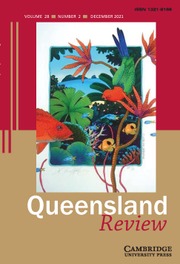No CrossRef data available.
Article contents
Sharon Faylene and the woman from the welfare: Heterosexual fulfilment and modernist form in Criena Rohan's The Delinquents
Published online by Cambridge University Press: 22 December 2016
Abstract
Criena Rohan's The Delinquents (1962) has always had a cult appeal — in 1989 it was made into a movie, starring Kylie Minogue as Lola and an unknown American as Brownie — and was recently reissued as a Text Classic. A short novel written by a writer who did not have a long career, and published between more commonly scrutinised periods of Australian fiction, The Delinquents is still, however, liminal. The Delinquents is very much a novel of rebellion and subversion, as its teenage protagonists, Brownie Hansen and Lola Lovell, pursue their love over the opposition of both sets of parents the police, the bourgeois consensus and everybody who is not them. By the fiery smoldering of its passion, though, their love sustains them and they emerge at the end, buffeted but united and resilient. This article argues that Rohan's book represents a Queensland iteration of a ‘regional modernism’.
- Type
- Queensland modernisms
- Information
- Queensland Review , Volume 23 , Special Issue 2: Queensland Modernism , December 2016 , pp. 196 - 206
- Copyright
- Copyright © The Author(s) 2016
References
Endnotes
1 For Courland Penders, see Corlette-Theuil, Ronald, Courland Penders: Coming home (London: Austin Macauley, 2014)Google Scholar.
2 Griffin, James, ‘Cash, Deirdre (1924–1963), Australian Dictionary of Biography (Canberra: ANU, 1993)Google Scholar, http://adb.anu.edu.au/biography/cash-deirdre-9707.
3 Schlossman, Beryl, Objects of desire: The madonnas of modernism (Ithaca, NY: Cornell University Press, 1999), p. 157 Google Scholar.
4 Latham, Sean, Am I a snob? Modernism and the novel (Ithaca, NY: Cornell University Press, 2003)Google Scholar.
5 Fabian, Johannes, Time and the other: How anthropology makes its object (New York: Columbia University Press, 1983)Google Scholar.
6 Rohan, Criena, The delinquents (Melbourne: Text, 2014)Google Scholar.
7 Nancy Fraser, ‘Feminism, capitalism, and the cunning of history’, FMSH-WP-2012-17, 2012, https://halshs.archives-ouvertes.fr/halshs-00725055.
8 Buckridge, Patrick and McKay, Belinda (eds), By the book: A literary history of Queensland (Brisbane: University of Queensland Press, 2007), p. 70 Google Scholar.
9 Modleski, Tania, Feminism without women: Culture and criticism in a ‘postfeminist’ age (London: Routledge, 1991), p. 43 Google Scholar.
10 Brian Reed, comment, Goodreads, https://www.goodreads.com/book/show/5995468-the-delinquents.
11 Herbertson, Ian, ‘Working-class youth subcultures: Resistance and exploitation in Criena Rohan's The delinquents and Mudrooroo's Wild cat falling ’, JASAL 10 (2010): 3 Google Scholar.
12 Herbertson, ‘Working-class youth subcultures’: 9.
13 Rohan, The delinquents, p. 144.
14 Rohan, The delinquents, p. 145.
15 Strakosch, Elizabeth, Neoliberal indigenous policy: Settler colonialism and the ‘post-welfare state’ (Houndmills: Palgrave Macmillan, 2015), p. 184 CrossRefGoogle Scholar.
16 Griffin, ‘Cash, Deirdre’.
17 Nicholas D. Kristof, ‘Conservative shakes up politics in Australia’, New York Times, 29 April, http://www.nytimes.com/1987/04/29/world/conservative-shakes-up-politics-in-australia.html.
18 Friedman, Susan Stanford, Provocations on modernity across time (New York: Columbia University Press, 2015)CrossRefGoogle Scholar.
19 Herring, Scott, ‘Regional modernism: A reintroduction’, Modern Fiction Studies 55 (1) (2009): 1–10 CrossRefGoogle Scholar.
20 Reeves, Troy, ‘Queensland's Nicklin government 1957–68: Modernisation, industrialisation and education’, Queensland History Journal 22 (5) (2014): 423–39Google Scholar.
21 Rohan, The delinquents, p. 125.
22 Rohan, The delinquents, p. 99.
23 Rohan, The delinquents, p. 77.
24 Rohan, The delinquents, p. 30.
25 Herbertson, ‘Working-class youth subcultures’, 10.
26 Rohan, The delinquents, p. 97.
27 Rohan, The delinquents, p. 159.
28 Latour, Bruno, ‘Why has critique run out of steam? From matters of fact to matters of concern’, Critical Inquiry 30 (2) (2004): 225–48CrossRefGoogle Scholar.
29 Rohan, The delinquents, p. 31.
30 Rohan, The delinquents, p. 72.




